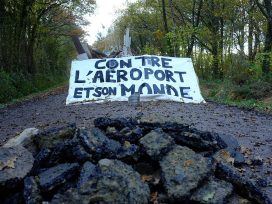Today, headlines from around the world resonate with the news that there are nearly six million Spanish citizens currently unemployed. Spaniards are in the process of losing their quality of life, along with their access to health, education and even food. The number of homeless people is rising and cutbacks and “reforms” continue without respite.
How is it possible for the country to accept that over half its population of under 25-year-olds are unemployed? How does a society sustain itself with over a million members living in households where not so much as a euro comes in by way of a monthly salary? How sick is a society when the only social group not to lose its purchasing power in recent years are the retired and when there are more than 150 home evictions per day? What is the impact of such a profound crisis on freedom of expression?
As could have been foreseen, street protests have only increased in size and intensity since the start of the crisis in 2008. And authorities have responded in equal measure.
The turning point was 15 May 2011, when – summoned by organisations such as Juventud sin future (Youth without a future), Democracia real YA! (Real democracy NOW!) and about 200 smaller citizen platforms – thousands of protesters occupied plazas and streets in 58 cities, starting with Puerta del Sol in Madrid. They claimed they weren’t being represented by traditional politics; they demanded a radical change in society. Immediately, the media linked the protests to the Icelandic rallies of 2009, to the 2011 revolutions in Tunisia and Egypt and to the movement set out in the best-selling book Indignez-vous! by Stéphane Hessel, a French Resistance hero, concentration camp survivor and co-author of the UN Declaration of Human Rights. Indignez-vous! (Time for Outrage!) rails against apathy and argues that anger and indignation can be a powerful motive for change. The protesters became known as the Indignados movement, or 15M, and became a global symbol.
A survey published by RTVE (Spanish public TV) reported on 6 August 2011 that, since 15 May 2011, between 6 and 8.5 million citizens had participated in the 15M movement, visited the campsites where protesters gathered, joined assemblies or took part in the demonstrations organised by “Democracia real YA!”
On assuming office in December 2011, Prime Minister Mariano Rajoy unleashed a seemingly unstoppable agenda of cuts intended to slim down Spain’s welfare state. It had to be defended. The protection of and provision for society had been secure for decades, but now it was regarded by Rajoy’s party as a luxury, and by the opposition as a key political victory that had to be won. For grassroots activists, it provoked an even stronger reaction, led by 15M.
As one reform followed another in waves, the 15M movement discovered who its allies were: state employees and civil servants who now perceived public services – basic health, education, assistance to immigrants and disabled people in vulnerable situations – to be at great risk, along with their own jobs. Civil servants became a target for conservative media. They were slow, they were “lazy”, they were “privileged”, they abused the system. A type of Orwellian Newspeak was being born. Spain has over three million state employees and the tales spun by the media talked endlessly of an over-abundance of public sector workers, in spite of the fact that, according to the International Labour Organisation, the percentage of public sector employees, compared to the overall workforce, is lower than that of some 15 other European countries.
Seeing that the regenerated social movements, along with trade unions and public sector employees, were uniting against government policies, it was virtually guaranteed that the streets would be permanently filled with protesters. “Labour reforms are going be at the cost of a [general] strike,” Rajoy practically bragged in January 2012, unaware that the television cameras were on him as he had an informal chat with his Finnish counterpart, Jyrki Katainen, on the fringes of a Council of the European Union meeting. Rajoy’s government has lived through two brutal general strikes that have affected the entire country and thousands of demonstrations. In Madrid alone, at least ten demonstrations are recorded daily.
Doctors, underground train and bus drivers, journalists, judges, district attorneys, lawyers, teachers, firefighters… every day a demonstration, almost never assembled by a trade union, but which can regularly count on the support of other movements, always connected through online social networks.
Police brutality
To every action there is always equal reaction on the opposite side. Excessive behaviour on the part of the police is hardly new, even at the least officially organised smaller demonstrations taking place in Spain. In their annual review of human rights across the world, Amnesty International has been recording police abuses of power in the country for some time. But in the course of the last two years, both political discourse and police heavy-handedness have increased to such an extent that public protest has been virtually criminalised.
In previous times, police only charged the crowds after dark, once the number of protesters had diminished and only those considered to be the most radical stayed behind. But recent months have seen police charge into town squares filled with families protesting peacefully.
The 15M movement emerged in a relatively peaceful environment. The first reports of major brutality by police were during a march to support miners from northern Spain in June 2012. On 11 July, a small group of troublemakers set off fireworks (an act that on earlier occasions would have raised tensions but not led to anything more disruptive), resulting in the deployment of hundreds of police, who, moving at full speed, shoved, hit and used truncheons against anyone in their way, many of whom sought refuge in the shops and bars that were still open. Seventy-six people were injured and seven were arrested.
Similar episodes took place outside the Congress building in September 2012, when the slightest provocation resulted in a massive police charge, with officers lashing out indiscriminately, firing off rubber bullets and pursuing individuals even inside train and underground stations, whether or not they had participated in the demonstrations. The media reported that 64 people were injured and that 35 had been arrested. Interior Minister Jorge Fernández Díaz declared the police had acted “magnificently” and that “some demonstrators” had used “excessive violence”.
Such an excess of police zeal gives rise to intermittently absurd situations. Feli Velasquez was stopped in the doorway of her own court hearing. She had been brought before the judge for having joined in one of the daily protests against the fact that, on average, 517 people are made homeless every day in Spain. As she entered the courthouse, a small group of people gathered in the doorway to support Feli and her colleagues. She was detained for participating in a gathering “without official approval”.
Repression has not always been physical: at times, it has taken the form of a political or economic deterrent, criminalising the act of protest. Members of local government in Madrid have indulged in phrases such as “extreme right-wing”, “extreme left-wing”, “illegal demonstration” or “coup d’etat”, soundbites that the press are often reluctant to question. This is clearly a strategy to typecast those who call for demonstrations as always violent, and one that seeks to damage the movement’s immense success in and reputation for attracting the support of people from all backgrounds. Prime Minister Rajoy has often praised those “normal people who remain at home”.
Once the demonstration has taken place, the strategy of dissuasion goes on: in December more than 300 individuals received a fine of 500 euros (656 dollars) for nothing more than having attended a protest on 27 October against the 2013 budget. According to information published by Spanish state news agency EFE, they constituted 10 per cent of the participants. The legal pretext was that the authorities had not been notified in advance of the gathering, a ruling that could have been applied exclusively to the organisers and not to the protesters as a whole.

As journalists, we have taken to wearing high visibility identity jackets and helmets. We’ve not quite reached the stage of wearing gas masks, as now happens in Greece. Yet. However, there have never been so many cameras, both professional and amateur, photographing everything – every police action, or reaction on the part of the protesters. Despite all this, and despite being clearly visible, there is no lack of examples of journalists being beaten, wounded or detained over the course of the past two years.
It has often been impossible to find out who is responsible for the brutality: the law states that police officers must identify themselves, displaying relevant information on their lapels. But riot police have on several occasions removed insignias from their uniforms or else covered them up with other articles of clothing as soon as they come into direct contact with demonstrators. The outrage on behalf of both the public and the media regarding the concealment of police identification numbers has evoked no political response whatsoever.
Has public protest become a crime?
In practice, the opposite has occurred: the Director General of Police, Ignacio Cosidó, let slip during a session of parliament that the Ministry of the Interior was looking into prohibiting the recording of police actions that could then be shown over the internet. It was a way of seeing how the idea was received and intended to cause alarm rather than lead to actual implementation. Still, even mention of it demonstrated a clear threat to press freedom in Spain.
Former minister of the interior and current president of the Grupo Popular (the governing Popular Party) in the European Parliament Mayor Jaime Oreja endorsed it on numerous occasions, commenting that it was “crazy that it was possible to view all these problems of public order on television because it only incited people to demonstrate all the more”. Although Cosidó moderated his remarks later on, dozens of journalists and commentators reacted to the director general’s statement with anger and vociferous debate.
The new penal code, to be introduced later in 2013, is more than just a threat. It will make passive, peaceful resistance – for example, chaining yourself to a door so you cannot be forcibly removed, or throwing yourself to the floor while being forcibly evicted from your home – into a serious crime against the authorities, equivalent to the public disorder of violence on the street. There has even been discussion about a clause permitting legal action against those who use the internet to encourage people to attend demonstrations that could potentially result in violence.
The endless ways to discredit, harass and criminalise citizen protest has direct opposition online. Social networks have become dramatically re-politicised since 15 May 2011. It was then that the seeds of indignation were sewn. They have developed into a vigilant citizen lobby, a furious but peaceful movement informed by a sense of outrage and distrust of power. Social movements give validity to the rearguard, to the intellectual construction of a model that resists both attacks and criminalisation. The network has confidence in itself as an underground labyrinth, well adapted to slip loose from the reins of power.
Further cutbacks are predicted, along with further economic adjustments, and more austerity, in the course of this year. No doubt they will come accompanied by further demonstrations.







